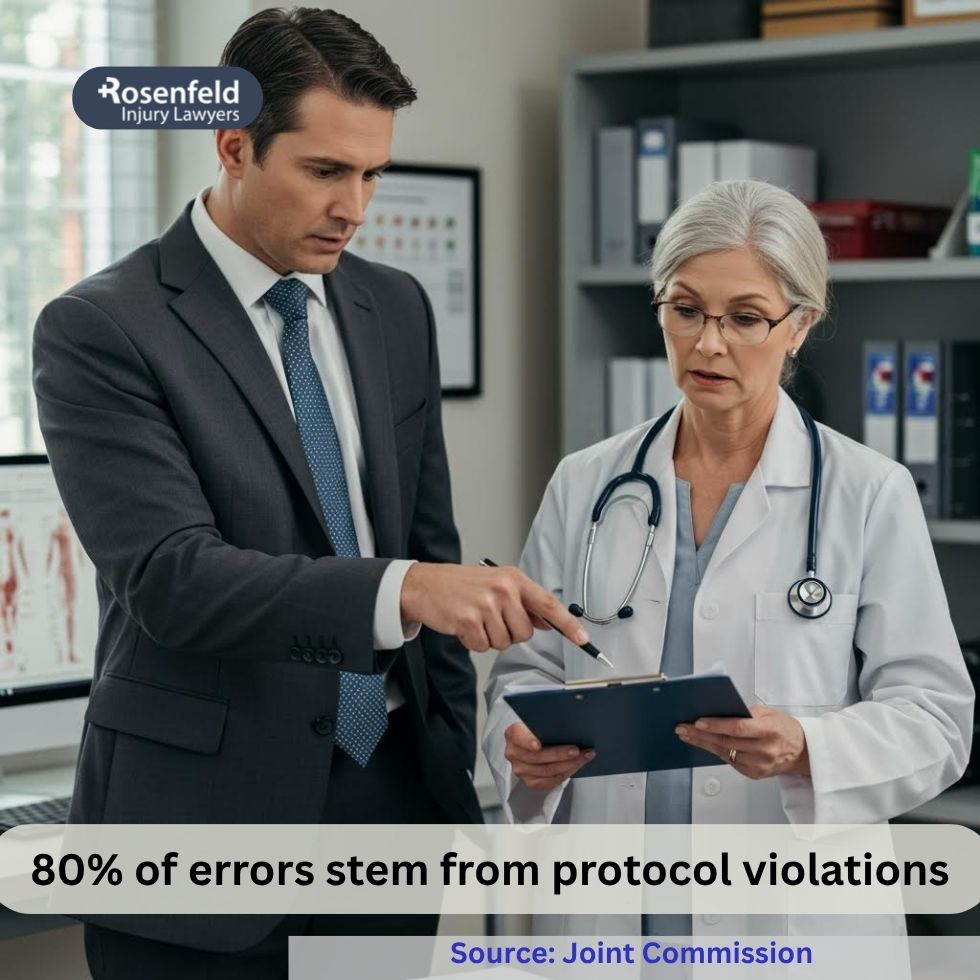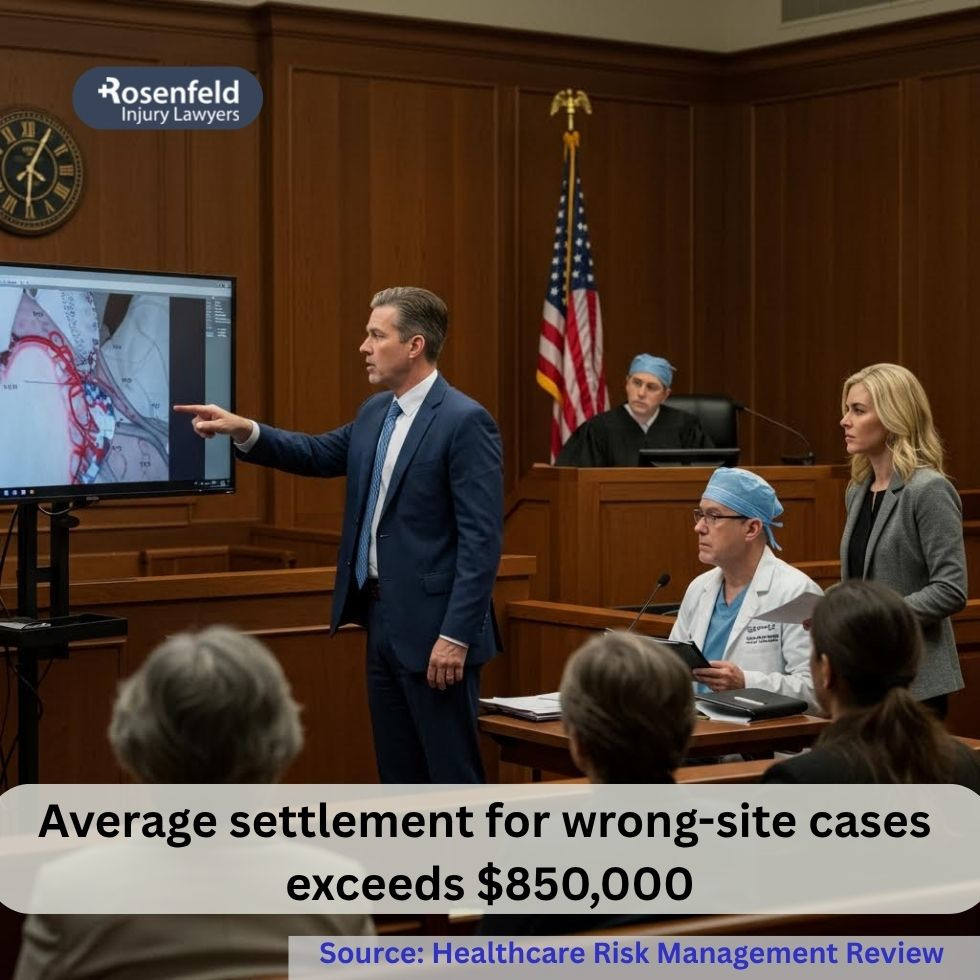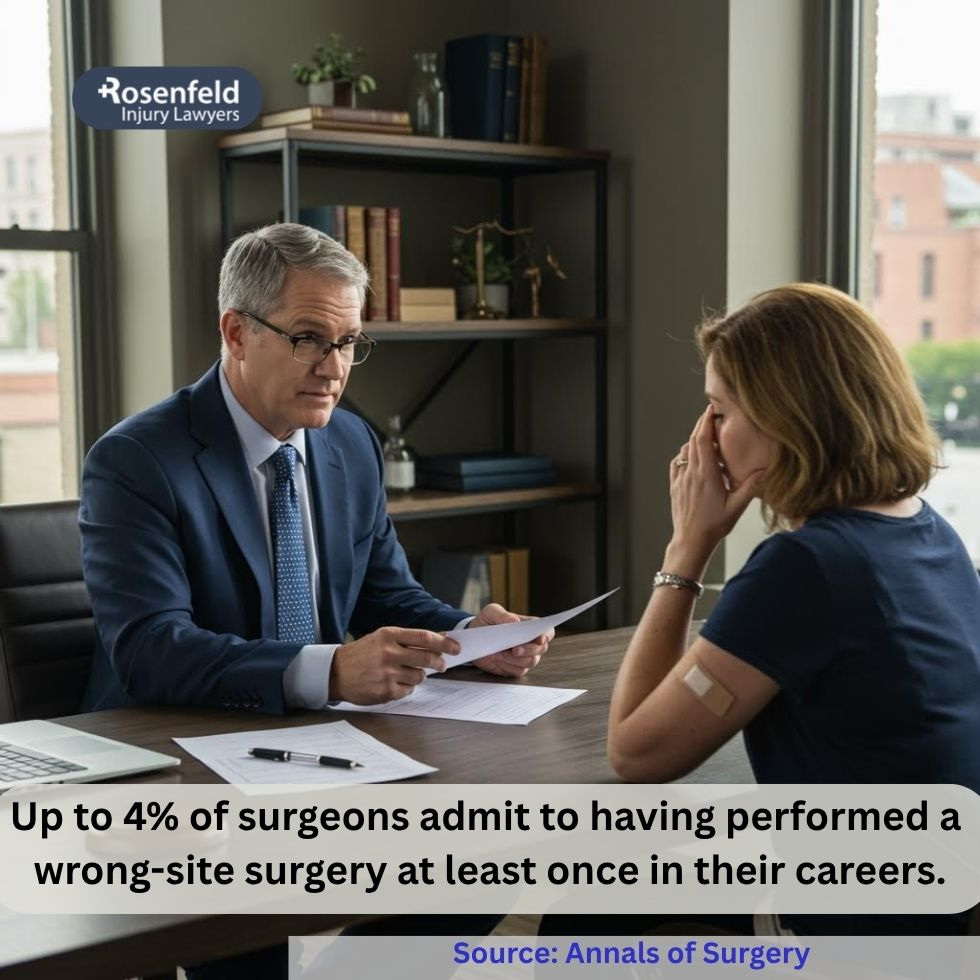- 24/7 Free Consultation: (888) 424-5757 Tap Here To Call Us
Chicago Wrong Site Surgery Lawyer

If you or a loved one suffered serious injuries from wrong-site surgery, Rosenfeld Injury Lawyers can help. Our experienced Chicago wrong site surgery lawyer team understands the devastating impact of surgical errors and medical negligence. We provide skilled legal representation to injured patients, seeking fair compensation for medical costs and lost wages.
What is Wrong Site Surgery?
Wrong-site surgery is a serious type of malpractice in which medical professionals mistakenly operate on an incorrect part of the patient’s body. This error includes performing surgery on the wrong body part, conducting the incorrect surgical procedure on the correct body part, or operating on the wrong anatomical location, such as an incorrect spinal level.
“Never Events”: A Breach of the Standard of Care
Wrong-site surgeries are classified as “never events,” meaning they are considered entirely preventable and should never occur in healthcare facilities. Because clear guidelines and safety protocols exist to eliminate these surgical errors, such as proper patient verification, surgical site marking, and mandatory pre-operative “time-outs”, their occurrence represents a clear breach of the standard of care.

Common Causes of Wrong Site Surgery
Wrong-site surgery is a preventable, yet common, surgical error caused by healthcare professionals failing to follow established safety guidelines. Understanding the common reasons behind these surgical mistakes can help injured victims recognize negligence and determine their legal representation and compensation options.
Inadequate Pre-Operative Verification Procedures
Hospitals require surgery teams to perform strict pre-operative checks, including mandatory surgical “time-outs,” to confirm the correct patient, procedure, and site. If medical professionals skip these vital safety measures or rush through them, the risk of surgical errors increases significantly, leading to serious harm and unnecessary patient surgery.
Miscommunication Among the Surgical Team
Effective communication between surgeons, nurses, anesthesiologists, and surgical technicians is essential to patient safety. Misunderstandings or miscommunications during patient transfers, shift changes, or procedure preparations can quickly escalate into surgical errors. Clear and consistent communication helps prevent opearating on the wrong site and protects patients from severe, preventable harm.
Failure to Properly Mark the Surgical Site
Marking the intended surgical site before surgery is vital for preventing errors. If medical professionals neglect this critical step or mark sites unclearly or ambiguously, confusion can arise during surgery. Ensuring consistent and standardized site marking procedures reduces the likelihood of operating on the wrong site.
Errors in Medical Records or Scheduling
Accurate medical documentation and scheduling are critical for surgical safety. Mistakes in patient records, incorrect scheduling information, mislabeled charts, or errors in entering patient details increase the chance of operating on the wrong body part. Reliable documentation and careful management of patient information help prevent harmful surgical mistakes.
Rushed Procedures and Distractions in the Operating Room
Operating rooms can become stressful, chaotic environments, particularly when medical teams feel rushed, understaffed, or distracted. This hurried atmosphere can lead surgeons and staff to overlook or skip crucial safety checks, significantly increasing the risk of medical errors such as wrong-site surgery, anesthesia errors, and foreign objects left inside patients.
Consequences of Wrong Site Surgery
Operating on the wrong site can cause devastating consequences for injured patients, including physical harm, emotional trauma, delayed treatment, and severe financial burdens. Victims deserve skilled legal counsel.
Physical Harm and Unnecessary Surgery
Patients subjected to wrong-site surgery endure unnecessary medical procedures that may lead to serious injuries, nerve damage, infections, or even death. Physical complications can cause significant pain, require extensive corrective medical treatment, and prolong patient suffering and recovery time.
Delayed or Incorrect Treatment
When surgeons mistakenly operate on the wrong body part, necessary medical treatment is inevitably delayed, allowing the patient’s original condition to worsen significantly. Delayed intervention can diminish treatment effectiveness, complicate recovery, and result in long-term health problems and permanent impairment for the patient.
Emotional and Psychological Trauma
Victims of wrong-site operations commonly experience emotional distress, anxiety, depression, fear of additional medical procedures, and a profound loss of trust in healthcare professionals. Psychological trauma resulting from surgical errors can significantly impair quality of life, impacting relationships, emotional well-being, and overall mental health.
Financial Burdens: Medical Expenses and Lost Wages
Wrong-site surgery can impose severe financial hardships on injured patients and their families. Victims often face steep medical bills from corrective surgeries, rehabilitation, medications, and ongoing medical care. Additionally, patients frequently lose income due to extended recovery periods, disabilities, or the inability to return to their previous occupation.
Liability for Wrong Site Surgery: Who is Responsible?
Determining who is responsible for wrong site surgery involves evaluating the roles and responsibilities of each medical provider involved. Since this type of surgical malpractice is entirely preventable, injured patients have the right to hold negligent healthcare professionals accountable and seek compensation for their losses.
Medical Malpractice: Negligence in the Operating Room
Wrong-site surgery is a clear and undeniable example of negligence. Medical professionals must adhere strictly to established safety protocols, including thorough patient identification, surgical site marking, and pre-operative verification procedures.
Failure to carefully follow these guidelines constitutes a breach of professional duty, directly causing unnecessary patient harm. Surgical mistakes such as operating on the wrong body part, conducting the wrong surgical procedures, or performing surgery on the wrong patient represent a severe failure in medical care, forming the basis for filing a medical malpractice claim.
Potential Defendants in a Wrong Site Surgery Case
Several parties may be legally responsible. Primarily, the surgeon performing the incorrect procedure can be liable for failing to confirm the correct surgical site. Anesthesiologists may also bear responsibility if they administer anesthesia without verifying the patient’s identity and intended procedure.
Nurses and surgical technicians responsible for preparing surgical instruments and confirming patient details may share liability for neglecting their duties. Hospitals and surgical centers can also face legal responsibility if they fail to establish clear protocols, adequately train staff, or enforce safety measures, resulting in preventable medical errors and patient harm.

How to File a Claim Following Surgery on the Wrong Site in Illinois?
If you’ve experienced wrong-site surgery in Illinois, understanding the steps involved in filing a medical negligence lawsuit is essential. The legal process can be complicated, and it’s vital to seek legal advice from an experienced Chicago surgery error lawyer who can help you protect your rights and pursue fair compensation.
The Affidavit of Merit Requirement
Illinois law requires plaintiffs filing medical malpractice lawsuits to submit an affidavit of merit from a qualified healthcare professional. This affidavit certifies that your claim has merit, identifying how the medical provider breached accepted standards of care, resulting in your injuries. An experienced attorney helps secure this necessary expert statement.
Drafting and Filing the Complaint
Your lawyer will prepare a formal complaint outlining allegations against responsible medical professionals and facilities. The complaint identifies the defendants, describes the negligence leading to the wrong site surgery, and details your damages. Your attorney then files this document in court, officially initiating your lawsuit.
The Discovery Process: Gathering Evidence
Both parties gather relevant information and evidence to build their case during discovery. Attorneys exchange information through depositions (testimony under oath), interrogatories (written questions), and requests for medical records and documents. Discovery clarifies the facts, establishes liability, and provides valuable evidence supporting your wrong site surgery claim.
Negotiating a Settlement
Many wrong-site surgery cases are resolved through settlement negotiations before reaching trial. Your lawyer engages with defendants and insurance representatives, presenting compelling evidence of liability and damages. Negotiations aim for a fair financial recovery covering medical costs, lost earnings, and pain and suffering without needing court proceedings.
Going to Trial: Presenting Your Case in Court
If a settlement isn’t achievable, your case proceeds to trial. Attorneys select a jury, present opening statements, provide evidence and expert witness testimony, and deliver closing arguments. The jury deliberates on determining liability and appropriate compensation for your wrong-site surgery injuries and related damages resulting from medical negligence.
Compensation for Victims of Wrong-Site Surgery
Patients harmed by wrong-site surgery have the right to pursue compensation for the financial and emotional damages caused by these preventable medical mistakes.
Economic Damages
Economic damages compensate for your direct financial losses resulting from wrong site surgery. These include past and future medical bills, costs of corrective surgeries, physical therapy, medications, medical equipment, rehabilitation, and lost earnings due to missed work or diminished earning capacity caused by your injuries.
Non-Economic Damages
Non-economic damages compensate victims for intangible losses related to wrong-site surgery. These include pain and suffering, emotional distress, anxiety, depression, mental trauma, disfigurement or scarring, loss of enjoyment of life, reduced quality of life, and the ongoing psychological impact resulting from surgical negligence.
Statute of Limitations for Wrong Site Surgery Lawsuits in Illinois
In Illinois, the statute of limitations for medical malpractice lawsuits is generally two years from the date the patient discovered or reasonably should have discovered the injury. However, the law sets an absolute maximum limit of four years from the date of the negligent medical act, regardless of discovery.
Why You Need an Experienced Chicago Medical Malpractice Lawyer
If you’ve experienced harm due to wrong-site surgery, seeking legal advice from an experienced surgical error lawyer is essential. Skilled medical malpractice attorneys understand Illinois laws and the process involved in surgical error lawsuits. They will carefully investigate your case, gather evidence, work closely with medical experts, and build a strong claim.
Your surgical error attorney will negotiate assertively with insurance companies and healthcare providers to ensure you receive compensation for your medical expenses, lost earnings, and emotional suffering. Dedicated legal counsel dramatically improves your chances of achieving maximum financial recovery and justice for your injuries.

How to Prevent a Wrong Site Surgery?
Preventing wrong-site surgeries requires healthcare facilities to establish clear, standardized protocols and consistently enforce compliance among medical staff. Rigorous pre-operative verification procedures significantly reduce medical mistakes, including comprehensive patient identification checks, precise surgical site marking, and mandatory surgeon “time-outs” before every procedure.
Facilities must promote open communication within surgical teams, provide ongoing staff training, and promptly address violations of established safety standards. Holding all healthcare providers accountable and ensuring complete adherence to patient safety measures prevents surgical malpractice incidents, protecting patients from serious harm, unnecessary medical treatment, and the devastating consequences of preventable surgical errors.
Book a Free Consultation

Rosenfield Injury Lawyers provides strong, compassionate legal counsel, guiding you through each step of the legal process. Our dedicated Chicago medical malpractice attorneys aggressively seek compensation for your expenses, lost income, pain, suffering, and long-term medical treatment.We work on a contingency fee basis, meaning you pay nothing unless we successfully recover compensation on your behalf. Call a Chicago personal injury attorney at (888) 424–5757 or fill out our contact form to schedule a free consultation.
All content undergoes thorough legal review by experienced attorneys, including Jonathan Rosenfeld. With 25 years of experience in personal injury law and over 100 years of combined legal expertise within our team, we ensure that every article is legally accurate, compliant, and reflects current legal standards.







